| Srl | Item |
| 1 |
ID:
126383
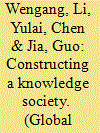

|
|
|
| 2 |
ID:
090326
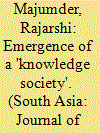

|
|
|
|
|
| Publication |
2009.
|
| Summary/Abstract |
In recent times knowledge has been recognised as a major source of efficiency, competitiveness, and economic growth and the resulting 'Knowledge Society' is supposed to be more egalitarian. Whether this happens depends on the level of penetration of the 'Knowledge Economy' (KE), its linkage with other sectors, the nature of the jobs created, and whether different stratum of society benefit from it equally. This paper uses the Indian experience to shed light on these issues. While huge potential for transition to a Knowledge Society exists in India, it would have to be preceded and accompanied by enabling policies such as investment in scientific research, standardisation of working conditions, and the building up of physical and social infrastructure.
|
|
|
|
|
|
|
|
|
|
|
|
|
|
|
|
| 3 |
ID:
137571
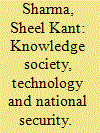

|
|
|
| 4 |
ID:
144047
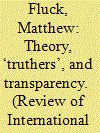

|
|
|
|
|
| Summary/Abstract |
The current era is often described in epistemic terms, as an ‘information age’ or ‘knowledge society’. Such claims reflect ideals that are deeply ingrained in modern societies. There is a widespread assumption that successful social and political interaction involves access to information and that political power is gained when knowledge replaces obscurity. Such assumptions reflect contemporary ‘epistemic folkways’, which are manifested in two widespread epistemic phenomena – faith in ‘transparency’ and conspiracy theorising
International Relations (IR) theorists should be well-equipped to understand such developments. However, reflection concerning epistemic matters in IR is in under attack, increasingly presented as a distraction from the formulation of empirically grounded accounts of international politics. This article argues that reflexive theory can in fact play an important role in helping IR scholars to understand contemporary epistemic folkways. Drawing on the Critical Theory of Theodor Adorno, it is argued that the transparency ideal and conspiracy theorising reflect the efforts of individuals to increase their influence in a world in which they are both objects of technical knowledge and, in principle, epistemically empowered subjects. Reflection on the subject-object relationship suggests that the pursuit of increasingly unmediated access to information is in fact a key source of reification and disempowerment.
|
|
|
|
|
|
|
|
|
|
|
|
|
|
|
|
| 5 |
ID:
116411
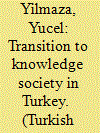

|
|
|
|
|
| Publication |
2012.
|
| Summary/Abstract |
The purposes of this study are to evaluate the phase Turkey is in with regard to the transition to a knowledge society and to discuss the priorities in relation to this process in the future. In this task, first, the concept of knowledge society is examined according to various views along with the properties that such a sociological structure needs to have. Then, the current state of Turkey is assessed. This is carried out on the basis of different studies published by International Telecommunication Union, United Nations, and Turkish State Planning Organization. In the last section, it is discussed how the transition process to a knowledge society in Turkey can be managed in a more effective and efficient way. This study points out that in Turkey important improvements especially with regard to infrastructure and education have to be achieved.
|
|
|
|
|
|
|
|
|
|
|
|
|
|
|
|